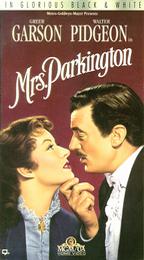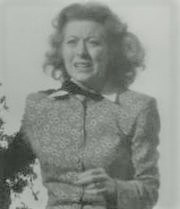Mrs Parkington ** (1944, Greer Garson, Walter Pidgeon, Edward Arnold, Agnes Moorehead, Cecil Kellaway, Gladys Cooper) – Classic Movie Review 11,571
MGM’s carefully made, well acted 1944 black and white drama film Mrs Parkington stars Greer Garson and Walter Pidgeon as husband and wife for the fourth time.
Director Tay Garnett’s 1944 MGM black and white drama film Mrs Parkington stars Greer Garson and Walter Pidgeon as husband and wife for the fourth time, along with Edward Arnold, Agnes Moorehead, Cecil Kellaway and Gladys Cooper. Polly James and Robert Thoeren write the screenplay, told via flashbacks, adapting the novel by Louis Bromfield.
Garson was nominated for an Oscar for Best Actress and Agnes Moorehead for Best Supporting Actress. Moorehead won the Golden Globe Award for Best Supporting Actress as Baroness Aspasia Conti.
A lovely cast boosts this often plodding soap drama about poor but socially ambitious Susie Parkington (Greer Garson) who marries money in the shape of mine owner Major Augustus Parkington (Walter Pidgeon), rising from boarding house maid to society matron.
The film is well enough written and carefully made, with sterling performances, especially by Garson and Moorehead. Also notable are Edward Arnold as Amory Stilham, Cecil Kellaway as Edward VII, Prince of Wales and Gladys Cooper as Alice (née Parkington), Duchess de Brancourt.
But it is sluggish and patchy, and Mrs Parkington didn’t lodge in the collective memory as did Mrs Miniver.
Also in the cast are Tala Birell as Lady Nora Ebbsworth, Frances Rafferty as Jane Stilham, Tom Drake as Ned Talbot, Dan Duryea as Jack Stilham, Helen Freeman as Helen (née Parkington) Stilham, Lee Patrick as Madeleine (née Parkington) Swann, Rod Cameron as Al Swann, Peter Lawford as Lord Thornley, Hugh Marlowe as John Marbey, Fortunio Bonanova Signor Cellini, Harry Cording as Humphrey, Hans Conried as Mr. Ernst, Gerald Oliver Smith as Taylor, Gordon Richards as James, Wallis Clark as Capt. McTavish, Al Ferguson as Miner, Byron Foulger as Norman Vance, Howard Hickman as Dr. Herrick, Brandon Hurst as Footman, and Selena Royle as Mattie Trounson.
Mrs Parkington is directed by Tay Garnett, runs 124 minutes, is made and released by MGM, is written by Robert Thoeren and Polly James, from the novel by Louis Bromfield, is shot in black and white by Joseph Ruttenberg, is produced by Leon Gordon, and is scored by Bronislau Kaper.
It was a major hit. Cost $1,574,000, box office $5,631,000, a profit of $2,198,000.
It is the fourth of eight movies pairing Garson and Pidgeon (or nine movie collaborations): Blossoms In the Dust (1941), Mrs Miniver (1942), The Youngest Profession (1943) in cameos, Madame Curie (1945), Mrs Parkington (1944), Julia Misbehaves (1948), That Forsyte Woman (1949), The Miniver Story (1950), and Scandal at Scourie (1953).
Garson received seven Academy Award nominations, winning for the 1942 Mrs Miniver.
She is the fourth most-nominated woman for the Best Actress Oscar, including a record-tying (with Bette Davis) five consecutive nominations (1941–1945) in the actress category.
Her nominations are: 1940 Best Actress Goodbye, Mr Chips, 1942 Blossoms in the Dust, 1943 Mrs Miniver, 1944 Madame Curie, 1945 Mrs Parkington, 1946 The Valley of Decision, and 1961 Sunrise at Campobello.
Derek Winnert 2021 Classic Movie Review 11,571
Link to Derek Winnert’s home page for more reviews: http://derekwinnert.com/




